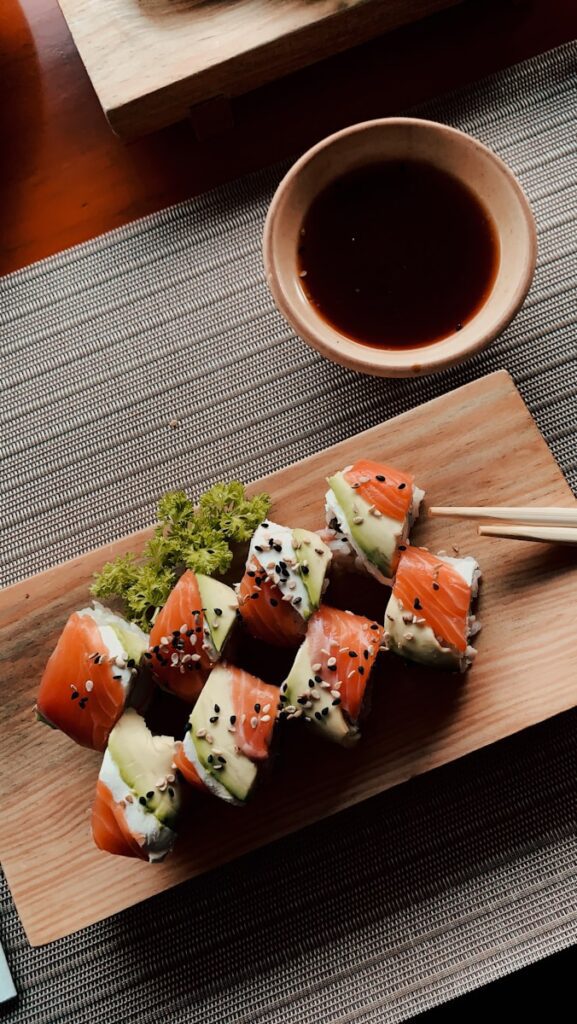This Post Contains Affiliate Links. Please Read Our Disclosure For Full Information.
If you’ve ever wondered why Japanese people seem effortlessly slim while the rest of the world battles stubborn waistlines, you’re not alone. Japan consistently boasts one of the lowest obesity rates globally—just around 3–5% compared to over 40% in the U.S.
Spoiler alert: It’s not magic. It’s lifestyle, food culture, and smart daily habits—all wrapped up in a way that feels natural, not like some miserable “diet” plan.
And the best part? You can totally steal these skinny secrets for yourself without moving to Tokyo. Here’s how!

1. They Eat Fresh, Simple, and Balanced Meals
Japanese meals are a masterclass in balance—small portions of rice, fish, veggies, fermented foods like miso and pickles, and maybe a tiny bit of meat. Processed foods? Not so much. Sugary drinks? Rare.
Their diet naturally cuts out the extra junk calories most of us struggle with, without feeling restrictive.
How to Steal It:
- Start with simple homemade meals—rice bowls, stir-fried veggies, miso soup.
- Swap fast food lunches with a Japanese-style bento box meal.
Amazon Picks for You:
2. Portion Control Is Built Into Their Culture
In Japan, there’s a concept called “Hara Hachi Bu”—which means eat until you’re about 80% full. That’s it. No calorie counting, no starving yourself.
Plus, they use smaller plates and bowls, so you feel like you’re eating a full plate of food without overloading your system.
How to Steal It:
- Switch to smaller dinnerware.
- Eat slowly—put down your fork (or chopsticks) between bites.
- Stop when you feel satisfied, not stuffed.
Amazon Picks for You:
3. Walking Is a Way of Life
While we hop in cars for even the shortest trips, Japanese cities are built for walking. People walk to train stations, markets, schools—you name it.
All that daily movement adds up to burning calories without even thinking about it.
How to Steal It:
- Take a 10-minute walk after meals.
- Use stairs instead of elevators.
- Try walking or biking for short errands.
Amazon Picks for You:
4. Fermented Foods = Happy Gut, Happy Weight
Miso, pickled vegetables, natto (fermented soybeans)—Japanese people eat a ton of probiotic-rich foods.
A healthy gut helps with digestion, metabolism, and even cravings.
How to Steal It:
- Add miso soup or kimchi to your meals.
- Try probiotic supplements if you’re not into fermented foods.
Amazon Picks for You:
5. They Drink Tons of Green Tea
Green tea isn’t just soothing—it’s loaded with antioxidants and can help with fat metabolism.
In Japan, people sip tea throughout the day instead of sugary sodas or fancy coffee drinks.
How to Steal It:
- Replace one sugary drink a day with green tea.
- Try matcha, a powdered form of green tea with even more antioxidants.
Amazon Picks for You:
6. Mindful Eating Is a Habit, Not a Trend
In Japan, meals aren’t rushed. People sit down, appreciate their food, and eat slowly. This mindful eating helps them naturally eat less without feeling deprived.
How to Steal It:
- Sit down for every meal.
- Avoid scrolling on your phone while eating.
- Chew slowly and enjoy every bite.
Amazon Picks for You:
7. Sweet Treats Are Rare and Small
Desserts in Japan are often less sugary and eaten in small portions. Think matcha mochi or fruit jelly instead of giant slices of cake.
How to Steal It:
- Opt for smaller portions of dessert.
- Try fruit-based treats instead of heavy pastries.
Amazon Picks for You:
8. They Stay Active—No Gym Membership Required
Not everyone in Japan hits the gym, but they do things like radio taiso—short group exercises done in parks, schools, and even offices.
How to Steal It:
- Try a 10-minute morning workout.
- Use fitness apps for simple home exercises.
Amazon Picks for You:
Final Thoughts
Japanese people don’t rely on crash diets or extreme fitness routines. Instead, their culture, habits, and environment naturally keep them slim.
If you want to steal their skinny secrets:
- Eat fresh, balanced meals.
- Control portions.
- Walk more.
- Drink green tea.
- Eat mindfully.
Start with one habit, then build from there. Your body (and waistline) will thank you!
We are giving it for free to our users
Get 7 Free Digital Planner
The Bundle Includes -
Daily Planner, Weekly Planner, Monthly Planner, Self Care Planner, Daily Reflection, Goal and Habit Tracker, Gratitude Journal and Budget Tracker










